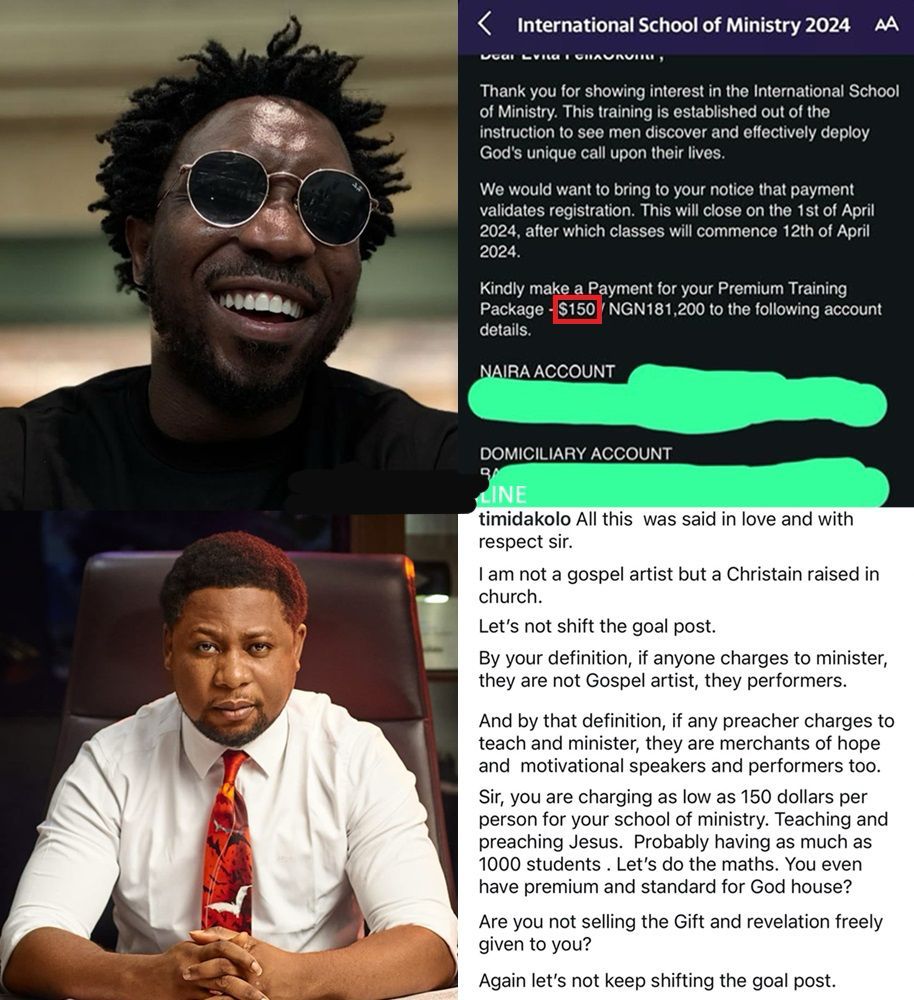
Timi Dakolo Calls Out Pastor Femi Lazarus Over $150 Ministry School Fee Controversy

Nigerian singer Timi Dakolo has sparked a heated debate online after publicly calling out Pastor Femi Lazarus for allegedly charging $150 for his International School of Ministry despite previously criticizing gospel artists for doing the same.
Dakolo, known for his powerful vocals and thought-provoking lyrics, took to social media to question the pastor’s stance on charging fees for ministry-related activities.
His statement came after an official announcement from Pastor Femi Lazarus’s ministry revealed that registration for the International School of Ministry 2024 required a payment of $150, approximately NGN 181,200.
The announcement further stated that payment validates registration, with the deadline set for April 1, 2024, and classes scheduled to commence on April 12, 2024.
While the initiative was positioned as a platform to train and equip individuals for God’s calling, Dakolo questioned whether this fee contradicted the pastor’s previous statements about gospel artists charging for their services.
The singer, who clarified that he is not a gospel artist but a Christian raised in the church, addressed Pastor Femi Lazarus with a tone of both respect and firm inquiry.
"All this was said in love and with respect, sir," Dakolo began, setting the stage for his argument.
He then pointed out what he saw as a contradiction, reminding the pastor of his previous criticism of gospel singers who charge for their ministrations.
"By your definition, if anyone charges to minister, they are not gospel artists, they are performers. And by that definition, if any preacher charges to teach and minister, they are merchants of hope and motivational speakers and performers too."
The statement quickly gained traction online, with many Nigerians engaging in discussions about the commercialization of religious teachings.
Dakolo further broke down the potential financial gain from the ministry school, noting that if the pastor had as many as 1,000 students enrolled, the earnings would be substantial.
"Sir, you are charging as low as $150 per person for your School of Ministry, teaching and preaching Jesus. Probably having as much as 1,000 students. Let's do the math. You even have premium and standard for God's house? Are you not selling the gift and revelation freely given to you?"
His comments struck a chord with many who have long debated the ethics of religious leaders charging fees for spiritual training.
Supporters of Dakolo’s argument pointed out that if ministry is a calling, it should be freely given as a service to God and mankind rather than being monetized.
On the other hand, some defended Pastor Femi Lazarus, arguing that running a school of ministry requires financial resources, including administrative costs, materials, and logistics.
A faction of social media users also pointed out that many established Christian training programs around the world require tuition fees, and that it is not uncommon for pastors to have structured learning platforms that involve payments.
However, critics maintained that the issue was not about whether a fee was charged but about the inconsistency in the pastor’s stance.
Dakolo’s call-out was not aimed at condemning the idea of structured learning within religious spaces but rather at highlighting the need for fairness and consistency when making statements about financial transactions within the gospel space.
As the debate raged on, some individuals urged Pastor Femi Lazarus to clarify his position and address the concerns raised by the singer.
Religious institutions and their financial dealings have always been a contentious topic, with many questioning the fine line between sustaining ministry operations and outright commercialization of faith.
Some argue that churches need funds to function effectively and that structured programs often require financial commitments.
Others believe that charging for teachings that are based on the gospel contradicts the essence of faith and service to humanity.
Dakolo’s statements have reignited this conversation, with many now waiting to see whether Pastor Femi Lazarus will respond to the accusations.
For now, the controversy continues to dominate discussions on social media, further fueling the broader conversation about money, ministry, and the role of
financial transactions in religious teachings.


